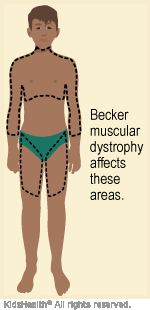Becker Muscular Dystrophy
What Is Becker Muscular Dystrophy?
Becker muscular dystrophy (often called Becker MD or BMD) is a form of muscular dystrophy, a genetic disorder that gradually makes the body's muscles weaker and smaller. It causes less severe problems than the most common type, Duchenne muscular dystrophy.
What Are the Signs & Symptoms of Becker Muscular Dystrophy?
Becker MD symptoms can range from mild to almost as severe as the symptoms of Duchenne MD.
A child with Becker MD may start to walk later than most kids do. But the disease rarely causes health problems until muscle weakness develops in the hips and pelvis when the child is in their teens. Walking problems are usually noticed around age 15–16.
A child with Becker MD may:
- have more difficulty with sports
- have trouble climbing stairs
- not be able to walk quickly, run smoothly, or maintain a running pace
- have trouble lifting heavy loads
- have calf muscles that look bigger than normal, even though they're weaker

Becker MD affects the muscles of the hips, pelvis, thighs, and shoulders, as well as the heart. Changes in the heart muscle may happen faster than in other muscles. Children who first show symptoms of Becker MD at younger ages are more likely to have heart problems than kids whose symptoms start later.
Becker MD is progressive, meaning problems get worse with age. Symptoms get worse slowly compared with Duchenne MD. Breathing muscles tend to stay strong enough that a ventilator or other mechanical breathing help isn't needed.
What Causes Becker Muscular Dystrophy?
Muscles need a protein called dystrophin (dis-TRO-fin) to work properly. In Becker MD, the gene that makes this protein is mutated (changed in some way). Because of this change, which usually is inherited (passed from parent to child), the protein doesn't work as it should. This puts muscle cells at risk for damage with normal use.
Usually, the body will repair or replace damaged muscle cells. But in Becker MD, the cells die instead. After the muscle cells die, they are replaced by fat and scar tissue.
Becker MD mostly affects boys. But girls and women can be carriers of the mutated gene and have mild symptoms. They also can pass the gene to their children.
How Is Becker Muscular Dystrophy Diagnosed?
Doctors often diagnose muscular dystrophy based on the child's family history, symptoms, and an exam. They will also order some tests:
- Creatine kinase (CK) level: This blood test checks the level of creatine kinase, a protein that normally stays inside muscle cells. When muscular dystrophy damages muscle cells, they release CK into the blood.
- Electromyography (EMG): This measures how well the muscles are working.
- Muscle biopsy: Doctors take a biopsy by removing a small piece of muscle, usually from the thigh. This test can show whether the muscular dystrophy is the Duchenne type or the milder Becker type..
- Genetic testing: This will show the mistake in the dystrophin gene. This helps the medical team decide how to treat the problem and know what to expect in the future.
How Is Becker Muscular Dystrophy Treated?
There's no cure yet for Becker MD. Treatment is a combination of:
- slowing the disease and assisting the heart using medicines
- helping the child move around using braces and other physical aids
A child with Becker MD usually is cared for by a team of doctors and other experts from several pediatric specialties.
What Can I Expect?
Kids with Becker MD can live long, active lives, and research to improve treatment is underway.
Some people with Becker MD begin using a wheelchair in their twenties. But many over age 50 can walk without help or by using a cane, crutches, or walker.
Becker MD does not affect muscles of the bowel and bladder or sexual function.
What Else Should I Know?
- If the mother and any sisters of a child with Becker MD are found to be a carrier, they should have regular visits with a cardiologist (a doctor who specializes in heart problems).
- Children with muscular dystrophy may have a harmful response to anesthesia. If your child must have surgery, make sure the anesthesiologist is aware of the MD.
- Genetic counseling should be a consideration for any adult with a Becker MD gene before having children.


